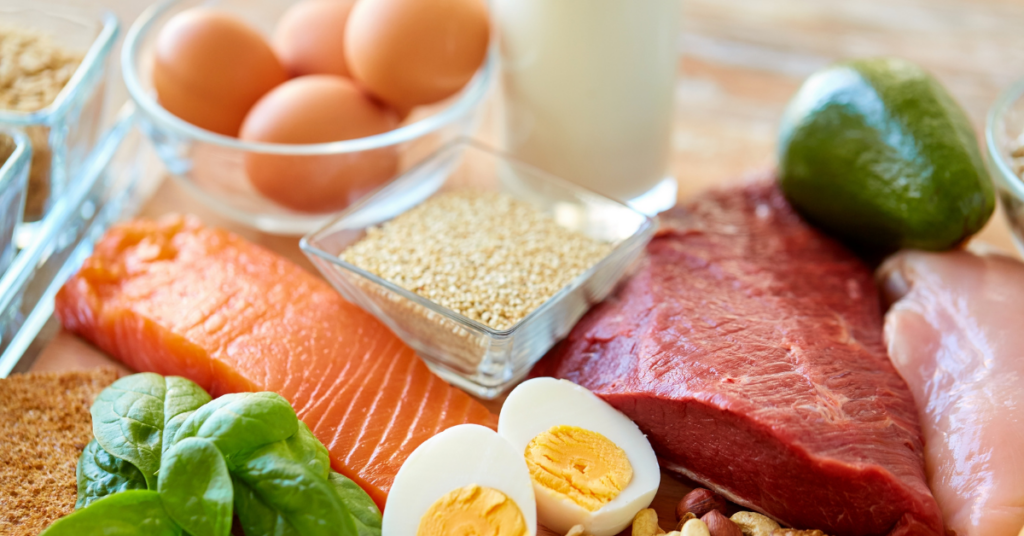Over the past few weeks, we’ve had some deep diving blog posts into a couple of nuanced and complex topic. Topics that often bring a lot of misinformation, sensationalism, and fear-mongering in artificial sweeteners and the low FODMAP diet. But in both of those pieces, we also briefly touched on another topic altogether. A topic that sits inside both of those topics, but also deserves it’s very own blog post because of some of the questions that come along with it. Because if we’ve learned anything over the last few weeks, we’ve learned that some of the things that happen inside the body are incredibly complex, and we’ve also learned that the same can be said for some of the things we eat, and how those things impact us.
That’s especially true with a topic that some of us know about, some of us are worried about, and something that just about all of us eat at some point or another. What’s that? Sugar alcohols.
What exactly are sugar alcohols?
Glad you asked! So sugar alcohols actually get their name because it’s a sugar molecule and alcohol molecule bonded together. But because sugar alcohols are a buzzkill, it’s not the actual kind of alcohol that you can use to forget your bad decisions. Despite the fancy sounding creation process that makes it seem like sugar alcohols are the product of the white coat geniuses getting together in a lab and inventing frankenfood, there are a number of sugar alcohols that are found naturally occurring in nature.
Thanks to the chemical structure that’s similar to sugar, sugar alcohols have a very sweet taste to them. That’s not to say that they’re sweet to the degree of artificial sweeteners, however. With artificial sweeteners, the upper limit of sweetness is virtually unlimited. With sugar alcohols what you see is a much more moderate picture. Most sugar alcohols will have fewer calories than sugar, but they’ll also be less sweet than actual sugar, although not to a noticeable degree. This is why they’re such a good additive for plenty of food products. They’re close enough in sweetness to keep you interested, but they save you calories, allowing you to feel guilt-free around what you’re eating. At least that’s what the food marketers want.
Speaking of food marketers.
One reason many people have heard about sugar alcohols might be because there have been a couple of diet companies that make diet food products that have come under scrutiny for their labeling practices. Specifically, using sugar alcohols as an additive to make something “low sugar”, marketing that item as low sugar, touting the benefits of net carbs, and more. While this is technically okay from a regulatory perspective, it can definitely feel misleading to consumers, since, at the end of the day, a carb is a carb. That includes sugar alcohols. So it can feel dishonest to be told you’re eating X amount of carbs when the protein bar you’re eating is really 10-12g higher. It’s a reminder that as consumers we have to pay attention to what we’re eating. Since, as we’ll soon see, sugar alcohols might be low sugar when compared to normal table sugar, but they can still act similar to sugar in the body.
Now, questionable labeling tactics aside, that doesn’t change the fact that sugar alcohols are still a useful food additive in all kinds of different situations. While sugar alcohols are carbs, remember from above that they’re also fewer calories than sugar. It’s that lower calorie content and the chemical structure similar to sugar that gives plenty of food companies a really useful and versatile additive. We can eat something containing sugar alcohol and suddenly light up the taste receptors similarly to how we might if we were eating a traditional sweet like candy. They can improve the mouthfeel of food, the taste of food, and the texture. All the while saving on calories.
While having great tasting food that can help you save on calories is awesome, it’s not really awesome if that causes you to feel bloated or gassy. And unfortunately, that is a reality that can come along with sugar alcohols. But why is that? Well, like we’ve talked about when looking into FODMAPs, the body processes carbs in a lot of different ways, including sugar alcohols.
Sugar alcohols kind of work similar fiber in the body.
One of the big things that people hear all the time about sugar alcohols is that they might cause people to feel gassy from time to time. In fact, if someone has a sensitivity to sugar alcohol that person might even have some chewing gum and then find that it upsets their stomach for a significant period of time afterward. Or this can be especially true if someone eats a significant amount of them in one sitting or day.
This happens because thanks to the structure of sugar alcohols they actually act very similar to fiber in the gut. Which means that as they work through the digestion process, they can cause some of us to bloat up as our bodies produce more gas and fluid in the process of trying to break these compounds down.
It’s important to understand that this process in itself isn’t a bad thing. This happens with all of us all of the time. In fact, this is the very reason that sugar alcohols can actually be a beneficial addition for the gut health of some while causing serious digestion issues for others. Just like other foods, like FODMAPs, for example.
As we’ve talked about in the past, digestion and food tolerance is a highly individual world. What works for some won’t work for others, and there’s nowhere that’s more true than when talking about sugar alcohols. For some, it seems that sugar alcohol might work as a prebiotic, giving the healthy bacteria something to feed on. While for others, typically those who are already experiencing digestive issues, sugar alcohols can just make you feel more bloated, gassy, and uncomfortable.
So why are they found in so many products?
Like we’ve talked about, sugar alcohols are a sweet tasting compound, but they also contain fewer calories than sugar. On top of that, some sugar alcohols can actually have a noticeable effect on things like mouthfeel, hence the reason you see sugar alcohols showing up in products like chewing gum. Since they can be a true utility player that fills a number of needs, they find themselves being used in all kinds of different foods.
Unlike artificial sweeteners, sugar alcohols aren’t going to be a guaranteed 0 calorie option for you. Which isn’t to say that sugar alcohol will add a ton of calories into your daily intake. Remember, they’re still fewer calories than sugar, which since it’s a carb, clocks in at 4 calories/gram. But they are an easy way to save on calories, especially when you’re looking to satisfy a sweet craving without blowing through your numbers for the day.
So what are some of the more common sugar alcohols out there?
Xylitol.
This is probably the most common sugar alcohol out there. It’s the one you’re going to find in chewing gum, a lot of toothpastes, and plenty of other oral care products. It’s also one of the most well-researched sugar alcohols out there.
In fact, xylitol is an interesting compound in that research shows that it’s fairly well tolerated in most people, which is great news for those out there who are worried about sugar alcohols and how they might impact their digestion. But on top of that, it’s also something that we see might actually play a role in helping people develop stronger and healthier teeth, which is always a bonus.
Oh, and one of the cool parts? Xylitol is sweet tasting but has only about 40% of the calories of sugar. Hello, saving on numbers!
Erythritol.
This is another of the more common sugar alcohols out there. It’s often one of the ones that you’ll find in packaged goods and other foods in grocery stores, partly because erythritol is known for having a good taste. That’s what happens when something has about 70% of the sweetness of sugar, but only 5% of the calories. Seriously, only 5%. That makes it a virtual no-brainer food additive for plenty of products out there. Oh, and some research suggests it might even be better for your dental health than xylitol.
On top of that, erythritol is one of the sugar alcohols that people typically tolerate very well, so those who are worried about their digestion are typically safe with erythritol. Because thanks to witchcraft that happens during the digestion process, erythritol doesn’t actually make it to your large intestine. Instead, you excrete this one through your urine. Which means that many of the bloating and gas issues that show up with other sugar alcohols don’t happen with this one.
Sorbitol.
This is one of the lesser known sugar alcohols, though it’s still a very common one that you’ll see in plenty of products. This one seems to be especially prevalent in sugar free spreads or other softer forms of food, thanks to the fact that sorbitol can actually have an impact on the mouthfeel of whatever it’s been added to. However, it’s also a sugar alcohol that has been shown to cause some digestive stress, so if you’re someone who is looking to take care of your digestive health or you know that you don’t tolerate sugar alcohols that well, this is one of the ones that you probably want to watch out for.
Maltitol.
Maltitol is an incredibly sweet sugar alcohol, almost as sweet as sugar itself. Maltitol is going to be safe for the vast majority of people who ingest it. Where certain complications may arise is that with maltitol, despite it not being actual sugar, it does still cause a corresponding spike in blood sugar.
This means that this particular additive might be an issue for someone who is diabetic. It’s certainly not going to be enough to cause gigantic complications for someone, but for someone who isn’t aware that a “sugar-free” product might still have an impact on their blood sugar, it can come as quite a shock to see that number as high as it might be after a meal that contains something with maltitol.
Speaking of blood sugar.
We just touched on something that is worth visiting, especially for anyone who is curious about sugar alcohols and how they might impact their blood sugar levels. See, sugar alcohols, despite their not being actual sugars, do cause a corresponding rise in blood sugar levels when they’re eaten. However, the degree to which they cause varies quite a bit.
As you can see in the image above, maltitol is the clear winner if we were holding a contest amongst all the sugar alcohols to see who could impact blood sugar levels the most. However, this is where context becomes important. Because just looking at the graph it can seem like maltitol causes quite a bit to happen in the body when it comes to blood sugar.
But, in reality, maltitol scores a 36 on the glycemic index scale. That’s just about half of what sucrose, or table sugar, scores. Additionally, we have to remember the glycemic index scale is how these foods impact blood sugar by themselves. It’s the score that those foods receive in a vacuum. Like we talked about when exploring sugar, few people eat any of these things by themselves, and the other foods that make up a meal will all impact the total glycemic index score of that meal.
What’s more, it’s not that glycemic index is typically something worth worrying about for most individuals. While there are lots of people who try to eat low-glycemic index diets, typically fibrous veggies and limiting refined carbohydrates, research doesn’t show there to be anything majorly superior about a dedicated low-glycemic index approach compared to foods that score moderately higher.
Where this advice might potentially change is if you’re someone who is pre-diabetic or diabetic, as managing blood sugar does become more important. So if you are someone with either condition, I would simply advise you to be a bit more careful, pay a bit more attention, and if you find that something consistently causes a dramatic spike in blood sugar, then it is typically going to be smart to try and limit your intake of that food as much as you can.
So when it comes to sugar alcohols, are they safe for you?
Research seems to show that for the vast majority of people out there, sugar alcohols are not only a safe additive, but they might also actually be something that benefits your health. Either your oral and dental health, your digestive health or overall adherence by allowing you to eat foods that have fewer calories while still satisfying some of the cravings that you’ve got.
Now, with that being said, we absolutely have to concede that everyone is different. Especially when it comes to gut health and how we handle certain foods or compounds. So the most salient advice anyone can give you would be: pay attention to how you feel after having some of these. Not just halfway pay attention, either. If you start experiencing some uncomfortable bloating or something similar, look back over your log for the day and try to identify if there’s something new or different from what you typically do.
Research shows that sugar alcohols, by all accounts, are safe for the vast majority of us. But what research shows and what works for you aren’t always the same exact thing, though they typically don’t differ near as much as some people think. So try them out, pay attention to how you respond, throw out what you find doesn’t work for you, keep what does, and keep remembering that sugar alcohols, like many other things, are simply nothing more than tools that can be used to help you along.







